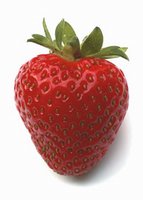ORGANIC FOOD - HOW DO YOU KNOW?

A fellow blogger asked, how do I know that something at the market labeled "organic" is actually organically grown?
Great question. I guess you have to have faith in our Department of Agriculture, since the feds set the organic standards that the farmers need to meet. Across the country there are certified farms -- you can start with California Certified Organic Farmers. They can provide a directory of farms either by purchasing a Directory from their online store, or you can join the organization and receive one for free.
LINK
Today, the labels that read Certified Organic or USDA Organic signify the same thing.
For those just getting up to speed - here's a quick overview...
Organic refers to methods of growing and processing foods that rely on the earth's natural resources. Pests and weeds are managed using earth-friendly methods -- such as beneficial insects and mechanical controls. Organic farmers work to build natural nutrients in soil, which help fertilize plants without the need for synthetic fertilizers. Organic processors and handlers package food that is natural from beginning and end.
The "Certified Organic" label...basically, it means that a third party has certified that the product is organic...CCOF (California Certified Organic Farmers)
is an organization that provides certification services throughout North and South America to processors, farms, private labelers, retailers, restaurants, brokers, and others. As a matter of fact, since October 2002, nation-wide, organic farmers and producers require that all foods labeled "organic" must be certified by a third-party certifier, such as CCOF.
Last year there was a court battle over whether "USDA Organic" products could contain synthetic ingredients, (according to Body+Soul, May 2006):
Packaged food and personal care products sold as "USDA Organic" must contain 95% organic ingredients -- substances produced without conventional fertilizers or synthetic pesticides, using methods that support the environment.
The other 5 percent may include either synthetic or natural ingredients -- but only if they're not readily available in organic form (such as vitamin C and boding soda) and they appear on a USDA-approved list.
Some organic-standards activitists feel the USDA-approved list is too loosely maintained. For updates eco-labels.org
Or check out the USDA's National Organic Program standards for a lot more detail
LINK
While we're on this label-thing:
GMO's -- Genetically Modified Organisms:
The USDA National Organic Standards prohibit the use of GMO's at any stage of organic poduction. Since GMO labeling is not in place, choosing organic is the only way for us to ensure that their food was produced without GMOs.
"No Spray" "Pesticide Free" and "Residue Free"
These labels do not ensure that food is organic. "Pesticide Free" usually means the edible parts of a crop have not been sprayed with harmful chemicals. However, the bad stuff -- synthetic fertilizers, insecticides and fungicides may have been used to grow the food.
The bottom line -- go organic. Food tastes soooo much better, and it's so much better for you and the environment. If you want to join a co-op for a discount on produce, check out localharvest.org for one near you. Be well, and enjoy!


3 Comments:
the best way to know if the food you are buying at the grocery store is organic is to look for the USDA seal on the package.
A farm that makes more than $5000 a year from crop sales may not use the terms "organic" or certified organic" unless they are indeed certified by a USDA approved organic certifying agency.
http://newfarm.org has a complete list of all the certifiers in North America
of course the best way to buy food is from a local farmer be it certified organic, sustainable or conventional
The reason there's no way to know if food at the supermarket is "organic" is because physically, it's no different from other food. There is *no* test which can detect if a food is organic, and nobody knows what an "organic" test would actually discover or look for. All I know for sure is, organic food is grown in poop and the US Centers for Disease Control and Prevention warn about it, and the Sierra Club is now saying that organic farmers spray bacteria on their crops to kill insects. Count me out.
Hi Lucy,
Thanks for your comments. I was half asleep when I mistakenly deleted your second comment. I had meant to publish it. If you still have it, and want to re-send, I'll try not to be an idiot and I'll post it. My apologies.
I'm a local farm supporter and will blog about it when I visit Black Walnut Farm in upstate NY this summer. They have a limited season, as they are in the Catskill Mtns.
I've been a guest at a few farms in my life and I must say, I really like waking up in a farmhouse. You must be hard-working, it's not an easy life. Take care,
galli galli sim sim
Post a Comment
<< Home